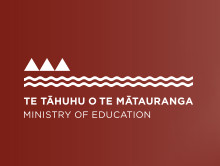He Kohikohinga 37
He mihi
He mihi tēnei ki ngā kaituhi o ēnei kōrero o Mā te Pouako mō He Kohikohinga.
- Ngā pikitia kei te whārangi 7 me te whārangi 9 nā Alex Resch © Alex Resch 2003
- Te pikitia o te papamuri kei te uhi o te pukapuka nā David Milan © David Milan 2003
-
Te whakaahua kei te whārangi 10 © PhotoDisc Vol. 10, Sports and
Recreation, 1994 Mana pupuri i ērā atu pikitia o te pukapuka © Te Karauna 2003
Kaihoahoa: Esther Chua
I whakaputaina tēnei pukapuka i te tau 2003 mō Te Tāhuhu o te Mātauranga e Te Pou Taki Kōrero Whāiti, Pouaka 3293, Te Whanganui-a-Tara, Aotearoa.
Pūmau te mana. Ngā tono ki te kaiwhakaputa pukapuka.
ISSN 1170 2370
Nama take 10742
Te marautanga reo Māori:
He Kohikohinga 37 targets students in years 3–5, from middle to senior primary school, and is written specifically but not exclusively for students in Māori immersion contexts. He Kohikohinga aims to appeal to students' interests and experiences while enhancing their knowledge of te ao Māori and te ao whānui. This collection of writing focuses on te hōtoke, with examples of writing from both the Poetic writing (Tuhinga auaha) and Transactional writing (Tuhinga whakawhiti mōhiohio) strands.
Please note:
To gain full benefit from He Kohikohinga 37 it is advisable that teachers attempt to work with some of the language features and ideas contained within these. The more students work with words both in reading, writing, and talking the greater their retention and later use of these features. The authors cannot emphasise enough the importance of providing a language rich environment by which students can experiment with, and practise freely newly acquired skills and ideas. Another important feature of a good reading programme is the planning and preparing for linking both reading and writing.



